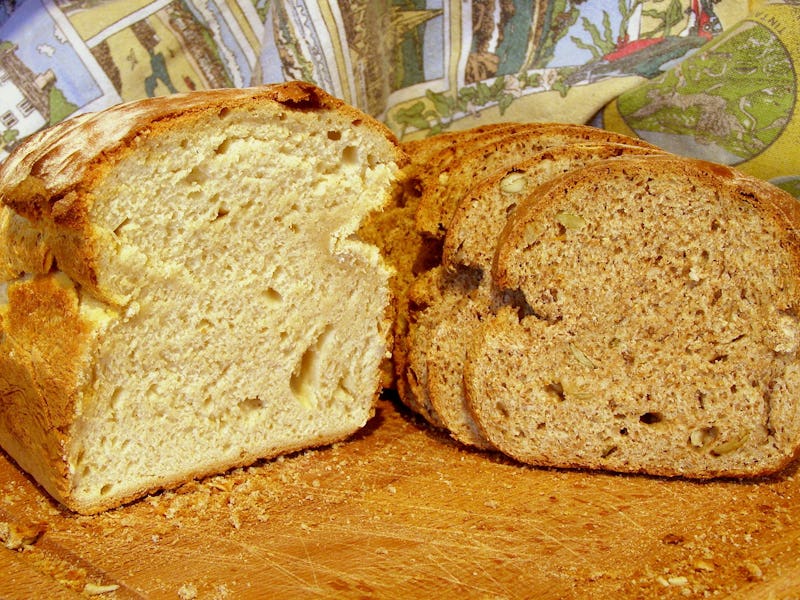Science Says Some Lucky Bastards Should be Eating White Bread
It's more about the person than the bread.

Switching from white bread to whole wheat is the most basic piece of advice you might hear if you’re trying to eat more healthily. But research on whether whole wheat is actually better for you than white bread has been somewhat contradictory, and some studies flat-out refute the claim. In fact, it turns out that depending on who you are, it might be better for you to eat white bread.
Any one trying to eat healthier is often told one basic, sad piece of advice: Give up white bread.
A small study published Tuesday in the journal Cell Metabolism, however, suggests that the type of bread that’s “better” for a person is determined by the microorganisms within a person’s digestive system, the microbiome. And for some people, that means white bread is just fine. Boom.
In a randomized crossover trial performed on 20 healthy subjects over two weeks, a team of researchers at two Israeli institutions, Weizmann Institute of Science and Tel Aviv Sourasky Medical Center, randomly assigned subjects to eat either white bread or whole wheat artisanal sourdough bread for a week at a time, then do the opposite after a two-week “washout” period. During the study periods, the scientists measured subjects’ blood as well as their levels of different microbial organisms. The assigned bread was the only wheat they were allowed to consume during the study periods.
Remarkably, the researchers found no significant difference between the two groups for 18 clinical factors including cholesterol, blood pressure, and weight. Nor did they find any significant difference between whole wheat and white bread in the primary measure for the study, the factor that gives white bread its bad reputation: glycemic control.
Let’s take a step back for a minute. White bread’s had a tough time in recent years, with research suggesting it’s akin to heroin in its effects on the brain, blaming something called the glycemic index, a measure of how fast a food will cause a person’s blood sugar to spike. These foods are mostly simple, easy-to-digest carbohydrates contained in highly processed white flour products. Foods with a higher glycemic index also have the double whammy of being considered junk foods and can lead to weight gain and blood sugar instability, as well as conditions related to these measures like diabetes. White bread has a high glycemic index and has also become synonymous with being “junk food.”
Whole wheat sourdough bread, on the other hand, boasts a more robust flour and a more complex colony of bacteria and fungi to leaven it, rocking a considerably lower glycemic index. As such, it should be better for glycemic control.
But the study in Cell Metabolism suggests that it’s not so simple. By applying statistical analysis to the data, researchers found that the glycemic effect of bread didn’t vary by which type of bread was consumed, but by who consumed it. In other words, some people saw a spike in blood sugar from white while some saw a spike from whole wheat. What’s more, they found they could predict this response based on microbiome composition.
Before you go shopping for a cartload of white bread, keep in mind that the study is tiny — only 20 subjects — so it’s decidedly underpowered. That said, the study measurements were rigorous, and the fact that each group ate both types of bread strengthens these results because researchers could compare each person’s response to both types of bread. You, in fact, might be one of the lucky jerks for whom white bread is actually better than whole wheat.
Abstract: Bread is consumed daily by billions of people, yet evidence regarding its clinical effects is contradicting. Here, we performed a randomized crossover trial of two 1-week-long dietary interventions comprising consumption of either traditionally made sourdough- leavened whole-grain bread or industrially made white bread. We found no significant differential effects of bread type on multiple clinical parameters. The gut microbiota composition remained person specific throughout this trial and was generally resilient to the intervention. We demonstrate statistically significant interpersonal variability in the glycemic response to different bread types, suggesting that the lack of phenotypic difference between the bread types stems from a person-specific effect. We further show that the type of bread that induces the lower glycemic response in each person can be predicted based solely on microbiome data prior to the intervention. Together, we present marked personalization in both bread metabolism and the gut microbiome, suggesting that understanding die- tary effects requires integration of person-specific factors.